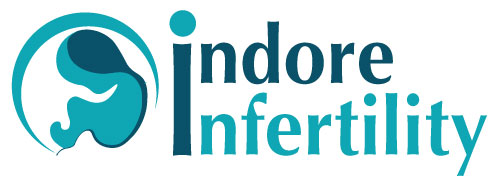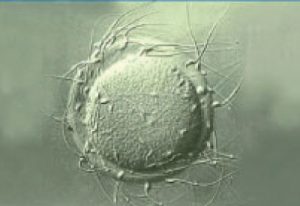
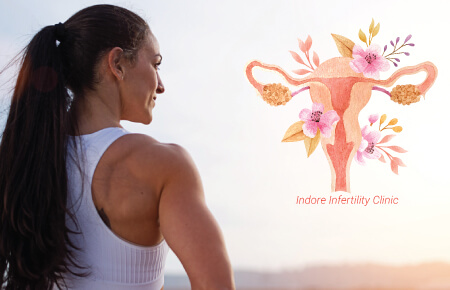
The number of women participating in various extreme sports and athletics is at an all-time high and is anticipated to grow. One of the reasons is availability of better training facilities and a reduced gender disparity in our society. The road to becoming a good sportswoman is one paved with multiple challenges like exhausting training to strict diet regimens. A commonly overlooked area is its impact on the female reproductive system, and what it means to get involved in extreme sports in terms of a woman’s fertility. Through this blog we want to shed light on this lesser talked about impact, and how sportswomen can ensure a healthy life along with achieving their sports ambitions.
Is sports always good for your health?
Engaging in sports has its benefits and also few drawbacks when it comes to too much involvement, here are some points to remember:
Pros:
- Physical Fitness: sports are a great way to enhance your metabolism and maintain a healthy heart, muscles and bones.
- Boosts your mood: Sports are well known to have a good impact on your mood through various mechanisms.
- Weight Management: engaging in regular sports can help keep the extra weight at bay, and keep you in good health.
Cons:
- Injury Risk: there are many kinds of injuries which can adversely impact your life like sprains, strains, fractures, and concussions.
- Overtraining: Excessive training can lead to physical and mental burnout, fatigue, and overuse injuries.
- Menstrual problems: Intense training, strict diet and low body fat can lead to irregular menses and anovulation (ovary doesn’t release an egg).
- Fertility Problems: Above menstrual problems can eventually lead to fertility problems in female athletes.
- Psychological Pressure: Perusing sports as a career comes with its own psychological issues like stress, anxiety, and body image concerns. These can affect the mental health of the woman.
It is importance to strike a balance between participation in sports and maintaining your health and wellbeing.
What is the impact of extreme endurance sports on fertility?
Female athletes should be mindful of these points about the impact of sports on their fertility, and make necessary changes if they want to plan a family.
- Irregular menstrual cycles: Extreme physical activity can lead to irregular cycles or sometimes complete cessation of menses. It is a known cause of menstrual abnormalities and absence of ovulation.
- Hormonal imbalances: Not only ovulation disorders, but the hormonal changes induced by intense sports can lead to various problems in conceiving, like difficulty in conception, implantation and miscarriages.
- Low Energy availability: High impact physical activities create a state of energy deficit in the body, which eventually effects a lot of bodily functions along with fertility in a woman.
- Bone health: The hormonal changes induced by extreme sports render a woman with poor bone health. Through delicate hormonal imbalance it can add to the fertility problems.
- Psychological stress: The psychological stress created out of competitive sports can also negatively impact fertility in sportswomen.
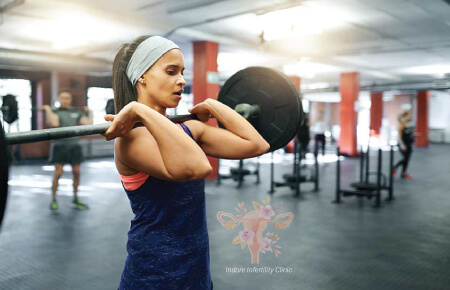
What is the impact of extreme weight training on your fertility?
Weight training has its own specific impact on female fertility. Let us have a look at the common issues women undertaking weight training face with their fertility:
- Hormonal Imbalance: There could be reduced estrogen hormone levels, which can impact the regularity of menstrual cycles and also ovulation.
- Menstrual Irregularities: It is not uncommon for weight trainers to face complete cessation of menses due to abnormality in the hormones at the pituitary and hypothalamus levels.
- Pelvic Floor Dysfunction: Intense weight training, especially weight lifting can lead to weakness of the muscles at the pelvic floor, increasing risks of urinary incontinence, pelvic organ prolapses and may lead to early pregnancy miscarriages and preterm labours in weight lifters.
- Body Fat Percentage: Often sportswomen have to maintain a certain body fat percentage, which can also increase problems with menstruation, ovulation. This also increases concerns about body image.
- Energy Deficiency: The energy deficit achieved with low calorie intake and high calorie burn adversely effects the body’s hormonal function. It is also detrimental to have an energy deficit while trying to get pregnant.
- Stress Response: The stress response generated due to intense physical activity increases the hormone cortisol. It plays havoc with a lot of fertility functions in the body, and is another culprit in fertility problems with female athletes.
- The Female Athlete Triad: It is condition commonly seen in female athletes, it includes –disordered eating, amenorrhea (absence of menses), and osteoporosis (reduced calcium and minerals in bones). This condition can significantly impact fertility and overall health.

What is the impact of extreme diet or caloric deficiency on your fertility?
Extreme dieting or maintaining a high calorie deficit creates a kind of alert response in the body, much similar to a flight or fight response. Our body shuts down all non-essential functions and perceives it as a survival scenario. Eventually a lot of hormonal disturbances occur, which severely impact fertility. Following are commonly noted fertility issues in women who are maintaining a calorie deficit for either losing weight or due to participation in competitive sports:
- Ovulation Disorders: Chronic starvation or calorie deficits can lead to anovulation (ovaries not releasing egg). This is a common reason for infertility in such women.
- Menstrual Irregularities: Absence of ovulation eventually leads to irregular menses. In extreme cases, complete cessation of menses can occur.
- Reduced Egg Quality: The quality of eggs is also reduced due to calorie deficit. This can also lead to reduced fertility, even if women are ovulating.
- Increased Risk of Miscarriage: The risk of miscarriage is significantly increased in women who have malnutrition or calorie deficit.
- Nutrient Deficiencies: Extreme dieting renders women deficient in essential nutrients like Iron, Zinc, Vitamin D, Calcium etc. Even if a pregnancy does happen, these can adversely impact the growing baby.
What is the impact of extreme sports on hormonal balance in the body?
Extreme sports can disrupt hormonal balance in women, affecting various hormones in the body. This can lead to conditions such as hypogonadotropic hypogonadism and anovulation (ovaries not releasing egg).
- Hypogonadotropic hypogonadism, is a condition in which the hormones are affected at the level of brain (Pituitary and Hypothalamus). Because it is these brain hormones which stimulates the ovaries to produce eggs, their deficiency leads to unstimulated ovaries. Since ovaries are not stimulated to produce eggs, it leads to infertility in female athletes.
- Anovulation, is the absence of ovulation, which occurs by mechanism described above. It leads to reduced sex hormones (estrogen and progesterone) in the body. These can lead to symptoms of hormone deficiency which can mimic symptoms of menopause. Reduced estrogen can also impair bone and heart health.
- Stress Hormones: stress hormones like cortisol and adrenaline are chronically raised in many sportswomen. As described earlier, they prepare the body for a flight or fight response, and also in the process impair a lot of other bodily functions.
- Endorphins: In physical stress situations like extreme sports, body also produces natural substances which help relieve pain, called endorphins. Though they are useful in coping with physical exertion, they also effect the hormonal milieu of the body.
- Thyroid Hormone: Thyroid hormone regulates our metabolism and plays a role in fertility also. Its levels can also be altered due to extreme sports.
Does intense physical training disrupt or affect menstrual cycles and ovulation?
Yes, intense physical training can disrupt ovulation and menstrual cycles. It happens by the following ways.
In normal ovulating women, the ovulation hormones are released first in the brain.
- The Hypothalamus releases a hormone called GnRH (Gonadotropin Releasing Hormone).
- GnRH triggers the Pituitary gland to release – FSH (Follicle stimulating Hormone) and LH (Luteinizing Hormone).
- FSH and LH stimulate the ovaries to release the egg from the ovary and also the release of hormones – Estrogen and Progesterone.
In women participating in extreme sports, the release of GnRH is disturbed, which leads to disturbance of the whole cascade of hormones which causes normal ovulation and eventually regular menses.
Body Fat Composition: In pre menarche age, sometimes there could be delay in onset of menses, because of extremely reduced body fat percentage. A body fat percentage above 22% is quoted in many scientific researches as a minimum around which normal ovulation occurs.
Individual Variability: Despite all above points, an individual’s genetics and body response can be significantly different from others. No formula exists to predict how your body will respond to extreme sports.
How should athletes manage their menstrual cycle?
Female athletes have to face a dual challenge, of training as well as scheduling their menstrual cycles to maintain peak performance. Following points can help in getting the best out of our performance according to your menstrual cycles.
- First step: Track your cycle, either using a calendar or a mobile app.
- Second step: Understanding the hormonal phases of a menstrual cycle. The menstrual cycle has two main phases:
- The Follicular Phase: starts from first day of cycle until ovulation. Marked by estrogen dominance.
- The Luteal Phase: it is the phase right after ovulation. The estrogen levels drop after ovulation. Progesterone levels rise in this phase.
Eventually both estrogen and progesterone levels fall, leading to menstruation.
-
ESTROGEN
It enhances physical performance. This hormone makes you feel more energetic and adventurous.
-
PROGESTERONE
It can reduce physical performance. This can make you feel dull and tiered. It is also responsible for pre-menstrual symptoms, like bloating, weight gain, mood changes etc.
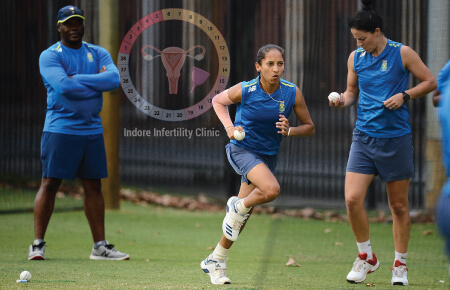
How to adjust training and competition according to your menstrual cycles?
Intense training and Competitions: The follicular phase is the estrogen dominant phase in each menstrual cycle. This would be the energetic and enthusiastic phase both physically and mentally. Use this time to get maximum out of your physical performance. Try and schedule intense training or competitions in this phase. As this phase comes to an end, with ovulation approaching. You will notice your physical performance more enhanced. Plan your activities accordingly.
Relaxation and recovery: The luteal phase is the progesterone dominant phase. Use this for other things like recovery after a competition or intense training session. Your body tends to feel dull and you might also notice lack of energy in this phase. You can still workout and train, but keep in mind the body’s natural hormonal reaction, and plan accordingly.
With above knowledge in hand, you can use this to your advantage in the following two ways:
Time your practice and competitions according to your natural menstrual cycle: This is the best way to maximize your performance without causing much discomfort.
Adjust your cycle according to your important competitions or training sessions: This is an option, but best used in limited circumstances. Altering your cycles every now and then can have detrimental effect on your health and fertility.
Consulting your gynaecologist is very important when you want to adjust your menstrual cycles for any competition or training.
Your gynaecologist will prescribe you medicines which are hormonal tablets to alter your cycles according to your schedule.
Your cycles can be either postponed or brought on early according to your needs.
The hormones given can be either combined hormonal pills, also called contraceptive pills, and progesterone only pills based on the plan of cycle alteration.
Generally combined pills are prescribed to bring on a period early or sometimes delayed, and progesterone pills are given mostly to postpone the period dates.
In some cases, these pills can be prescribed continuously without a break over a period of 2-3 cycles to avoid menstruation altogether.
It is very important that these medicines are only taken after a doctor’s prescription.
Using these medicines without consulting a doctor could do more harm than the intended benefit.
Frequent alteration of cycles without doctor’s consultation could also be harmful and should be avoided.
Are menstrual cups a good option for young athletes and sportswomen?
Menstrual cups are the newest edition to the female hygiene products. These are generally made of silicone and come in different sizes. These can be inserted into the vagina, and they keep the blood contained.
Pros of menstrual cups:
- Cheaper than other methods over a period of time.
- Give good relief from the discomfort and skin irritation during menses, as all the blood is collected inside.
- More ecofriendly, as they don’t generate any waste.
- Long lasting, as a good quality cup can last around 2 years.
Cons of menstrual cups:
- Need more investment in the beginning, as cups are expensive than sanitary pads or tampons.
- Need to be sterilized, and adequate hygiene measures while using it.
- Needs practice to insert properly.
- Not preferred in any active genital tract infection.
- Needs to be emptied at least 6-8 hrs to avoid spillage and infection.
Is there any harm in taking medication for managing menstrual cycle to match professional schedule for sports women?
Yes, using medicines to alter one’s menstrual cycles have some consequences like:
- Disturbed Hormonal milieu: Using external hormones for cycle manipulation has impacts like disturbing the natural hormones in the body. It can suppress the body’s own hormones and can disturb the natural menstrual cycles, even after the treatment is over.
- Reduced Fertility: Using external hormones for prolonged periods can negatively impact fertility.
- Side Effects of Hormones: The hormones used for cycle manipulation have their own side effects like, bloating, weight gain, low mood, breast discomfort, acne and many others.
What kind of medication should be taken to manage menstrual cycle?
Managing a menstrual cycle could involve either altering the period dates to utilize the timing for any reason, and also dealing with the problems faced during menstruation.
To know more about how to alter your cycles, please read the above question answering the similar topic.
To manage the symptoms during menses, following can be used:
- Over the counter pain medications in case of severe pain during menses
- Prescription drugs like Tranexamic acid in case of heavy bleeding
- Symptomatic treatment with prescription drugs according to your particular period related problems.
What are the pros and cons of taking medication to manage menstrual cycle?
Following are the pros and cons of taking medications to alter your menstrual cycles:
Pros:
- Better control over your period dates, especially in cases of irregular cycles.
- Ease of planning of competition dates and intense training, read above answers to know more.
- Relief of menstrual problems like heavy bleeding, painful periods or pre-menstrual syndrome.
Cons:
- Side effects of the medicines and hormones taken.
- Disturbed natural menstrual cycles.
- Added cost of the medicines taken.
- Risks of blood clots, weight gain, hormonal imbalance.
How frequently can one take medication to manage menstrual cycle without impacting long term fertility?
Taking medications sometimes to alter your menstrual cycles is unlikely to cause any major long-term effect on your fertility. But taking them for prolonged periods might impact your fertility in the long run. Though there is no set limit for how frequently one can safely take such medicines. Using them for the minimum time period and only for reasonable and important cause would be advised.
What is the best and safest medication to take for managing menstrual cramps?
Menstrual cramps happen due to contractions in the uterus during your periods. These can be more severe if you have any other uterine condition, like fibroids, adenomyosis, endometriosis etc. The general treatment revolves around using over the counter pain medications and some anti spasmodic drugs to ease the pain of menstrual cramps. Some over the counter medicines available for menstrual cramps are:
- Ibuprofen
- Paracetamol
- Mefenamic acid
- Drotaverine
If you have excessive cramps due to any uterine condition mentioned above, your gynaecologist can prescribe you above drugs alone or in combination. They can also prescribe you a course of combined hormonal pills, as they are also known to alleviate the menstrual pain in severe cases.
When should a gynaecologist be consulted for sports women? What are the red flags that should be kept in mind?
Ideally a gynaecologist can be consulted for any concerns pertaining to female health, following issues should be thoroughly discussed when meeting one:
- Irregular periods
- Severe menstrual problems like abdominal cramps, excessive bleeding etc.
- Abnormal bleeding – irregular, erratic bleeding.
- Absence of menstruation
- Delayed onset of periods
- Not able to get pregnant
- In need of contraception
- Any abnormal vaginal discharge or genital infections
Following Red Flags mandate an urgent consultation with a gynaecologist:
- Missed periods, or known pregnancy test positive
- Sudden and sever pelvic pain
- Sudden heavy bleeding
- Vaginal discharge with fever and chills
- Trauma to the genital area due to sports or otherwise
- Trauma to the abdomen or pelvis while pregnant
What is the impact of psychological stress of extreme sports on a female’s fertility?
Being a sportswoman can be very rewarding and yet like all demanding professions, it can induce a lot of psychological issues as well. Participating in competitive sports can cause the following psychological problems in women:
- Depression
- Anxiety
- Sleep disturbance
- Eating disorders
- Body image concerns
Psychological stress can as a result impact fertility in females, following are the common reasons:
- Hormonal imbalance and anovulation: Psychological stress is also a reason women don’t ovulate sometimes. It is known to cause infertility in women.
- Stress can reduce the libido in women, and be a reason for reduced fertility.
It is essential to enjoy sports while taking care of your mental health. Taking help from a psychiatrist or psychologist is the key step when faced with psychological stress related to your sports career or otherwise. Following can help cope with stress:
- Yoga
- Meditation
- Journaling
- Spending time with friends and family
- Taking time for self-care
- Consulting a psychiatrist / therapist
How can female athletes mitigate the risk associated with extreme sports on their fertility?
Sportswomen should be cautious of their health and fertility concerns while engaging in extreme sports and intense training.
Keeping in mind the following points will help you maintain good health and fertility while perusing your passion in sports:
- Eat a healthy nutritious diet: Make sure you take enough proteins to combat the muscle loss, along with essential vitamins and minerals like iron, calcium, zinc.
- Maintain good hydration and electrolytes: maintaining electrolyte balance is essential to avoid physical exhaustion.
- Avoid extreme calorie deficit: as discussed earlier, avoid being severely calorie deficient.
- Maintain healthy weight and body fat percentage: it is important to not try and reduce your body fat percentage below the normal levels, which are important for ovulation.
- Get sufficient rest and recovery: recovery is the key to keep giving your best on the sports field.
- Get good sleep: getting a good 7–8-hour sleep helps restore a lot of bodily functions.
- Avoid over training: it can cause burnout and cause serious physical damage.
- Try to synchronize your menstrual cycles and your sports schedule: As discussed above, try and utilize the knowledge about menstrual cycle phases to maximize your performance.
- Regularly consult with your gynaecologist: It is important to keep discussing your concerns and health issues with your OBGYN.
- Avoid self-medication for altering your period dates and other symptoms: Self medication will do more harm than benefit, and thus, whenever you need medication, please consult a doctor first.
- Take care of your bone health: It is essential to take calcium, zinc, magnesium and vitamin D through diet and supplements. Ignoring bone health can lead to serious bone conditions at a later age.
- Manage stress and avoid physical and mental burnout: taking help of mental health professionals when needed, taking time to decompress and relax mentally is also essential.
- Take infertility doctor’s consultation if unable to conceive
- Consider fertility preservation, if you want to delay pregnancy, after consultation with your fertility doctor
- Consider contraception if not planning pregnancy
- Limit caffeine or stimulants
- Limit or avoid – smoking, alcohol, drugs
- Avoid performance enhancing drugs / supplements
